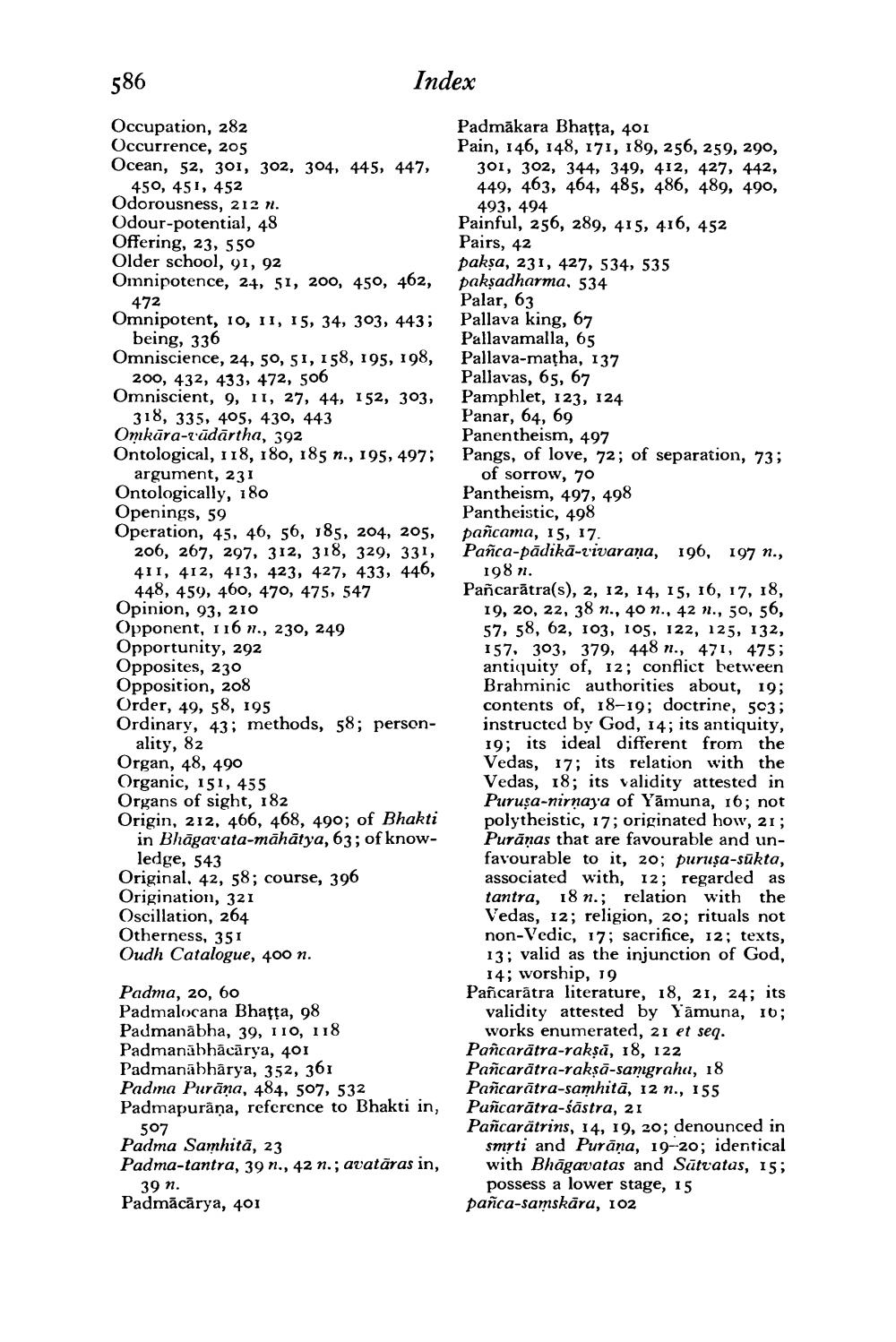________________
586
Occupation, 282
Occurrence, 205
Ocean, 52, 301, 302, 304, 445, 447,
450, 451, 452 Odorousness, 212 1. Odour-potential, 48 Offering, 23, 550 Older school, 91, 92 Omnipotence, 24, 51, 200, 450, 462,
Index
472
Omnipotent, 10, 11, 15, 34, 303, 443; being, 336
Omniscience, 24, 50, 51, 158, 195, 198, 200, 432, 433, 472, 506 Omniscient, 9, 11, 27, 44, 152, 303,
318, 335, 405, 430, 443 Omkara-vādārtha, 392 Ontological, 118, 180, 185 n., 195, 497;
argument, 231 Ontologically, 180 Openings, 59
Operation, 45, 46, 56, 185, 204, 205, 206, 267, 297, 312, 318, 329, 331, 411, 412, 413, 423, 427, 433, 446, 448, 459, 460, 470, 475, 547
Opinion, 93, 210
Opponent, 116 m., 230, 249 Opportunity, 292
Opposites, 230 Opposition, 208 Order, 49, 58, 195 Ordinary, 43; methods, 58; personality, 82
Organ, 48, 490
Organic, 151, 455 Organs of sight, 182 Origin, 212, 466, 468, 490; of Bhakti in Bhagavata-mahatya, 63; of knowledge, 543
Original, 42, 58; course, 396
Origination, 321
Oscillation, 264
Otherness, 351
Oudh Catalogue, 400 n.
Padma, 20, 60
Padmalocana Bhatta, 98 Padmanabha, 39, 110, 118 Padmanabhäcārya, 401
Padmanabharya, 352, 361 Padma Purana, 484, 507, 532 Padmapuraṇa, reference to Bhakti in,
507
Padma Samhita, 23 Padma-tantra, 39 n., 42 n.; avatāras in,
39 n. Padmācārya, 401
Padmākara Bhatta, 401
Pain, 146, 148, 171, 189, 256, 259, 290,
301, 302, 344, 349, 412, 427, 442, 449, 463, 464, 485, 486, 489, 490, 493, 494
Painful, 256, 289, 415, 416, 452 Pairs, 42
pakṣa, 231, 427, 534, 535 pakṣadharma, 534 Palar, 63 Pallava king, 67 Pallavamalla, 65 Pallava-matha, 137 Pallavas, 65, 67 Pamphlet, 123, 124 Panar, 64, 69 Panentheism, 497
Pangs, of love, 72; of separation, 73; of sorrow, 70 Pantheism, 497, 498 Pantheistic, 498
pañcama, 15, 17. Pañca-padikā-vivarana, 196, 197 n., 198 n. Pañcarātra(s), 2, 12, 14, 15, 16, 17, 18, 19, 20, 22, 38 n., 40 n., 42 n., 50, 56, 57, 58, 62, 103, 105, 122, 125, 132, 157. 303, 379, 448 m., 471, 475; antiquity of, 12; conflict between Brahminic authorities about, 19; contents of, 18-19; doctrine, 503; instructed by God, 14; its antiquity, 19; its ideal different from the Vedas, 17; its relation with the Vedas, 18; its validity attested in Purusa-nirnaya of Yamuna, 16; not polytheistic, 17; originated how, 21; Purāṇas that are favourable and unfavourable to it, 20; purusa-sūkta, associated with, 12; regarded as tantra, 18 n.; relation with the Vedas, 12; religion, 20; rituals not non-Vedic, 17; sacrifice, 12; texts, 13; valid as the injunction of God, 14; worship, 19 Pañcarātra literature, 18, 21, 24; its validity attested by Yamuna, 10; works enumerated, 21 et seq. Pancaratra-rakṣā, 18, 122 Pañcaratra-rakṣā-samgraha, 18 Pañcaratra-samhita, 12 n., 155 Pañcaratra-śāstra, 21
Pañcarātrins, 14, 19, 20; denounced in smrti and Purana, 19-20; identical with Bhagavatas and Sutvatas, 15; possess a lower stage, 15 pañca-samskāra, 102




